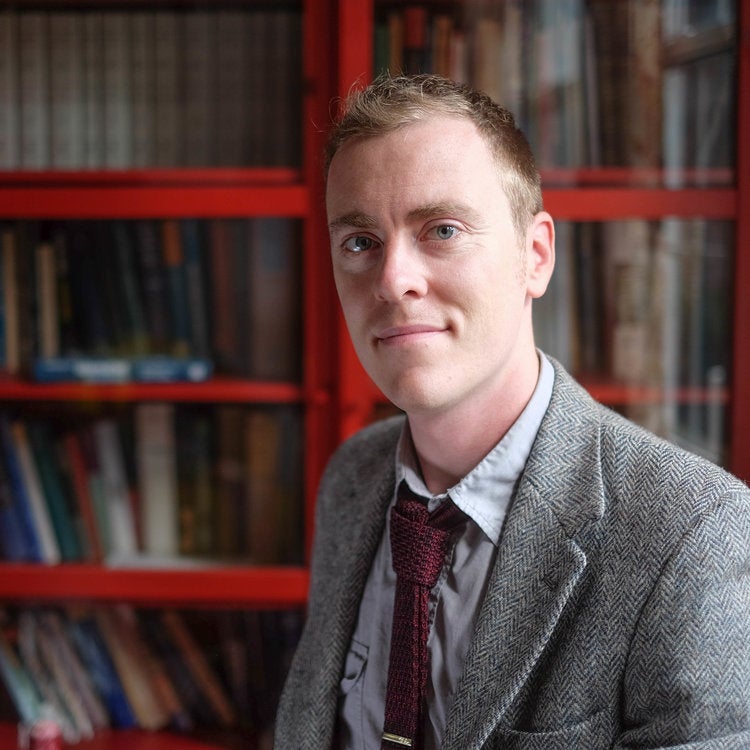
Could you tell us a little about yourself?
I grew up in St. Paul, Minnesota and went to school at St. Olaf College where I majored in history. However, I’ve been "out East," as they say in Minnesota, for the last 9 years, 3 in Princeton, NJ where I got an M.Div from Princeton Theological Seminary, and 6 in Washington D.C. I live in Glover Park with my wife, a minister at Georgetown Presbyterian Church, and two daughters, ages 6 and 7. I love baseball, photography, history, theology, and tacos (my wife and I have a neighborhood taco night at our house every Friday!). I’ve had the opportunity to intern and work with the Smithsonian National Museum of American History, the Center for Folklife and Cultural Heritage, and most recently with the Local History/Special Collections branch of the Alexandria Library system.
You are a relatively recent MLIS graduate of Valdosta State University. What attracted you to the profession?
A number of things attracted me to working in libraries, and specifically archives. I’m very interested in history, and I’m particularly interested in the "stuff" of history, which is often collected in archives—the pamphlets, photos, letters, newspapers, etc. All that "stuff" makes the time and place of that period come alive for me and that’s exciting to be able to live in every day. It’s like working in a museum, but instead of everything being behind glass, I get to touch it all!
I also enjoy the detective work needed to do good research. For a number of reasons, the majority of information inside an archive isn’t "google-able," which makes every research question an interesting puzzle to solve. Moreover, I also get to help patrons and learn about the material myself. This means I have the opportunity to learn about something new every day.
Finally, I also enjoy being in the academic world and I enjoy being vicariously involved in the broader scholarly conversation. My own work is very practical (e.g. hunting down boxes, organizing collections, digitizing material, etc.), and it’s gratifying to have that work fit into the wider world of scholarship where I can see the fruit of my labor.
You also have a background in theology with an M.Div. from Princeton Theological Seminary. What area of theology did you specialize in?
Most of my courses were in systematic theology, which attempts to understand theological statements as part of an interconnected whole (e.g. How do statements about God affect statements regarding salvation). While at seminary, I did most of my work on 19th and 20th century Protestant theology, but I was also interested in Roman Catholic theologians who were in dialogue with Reformed and Lutheran theology, like Karl Rahner, Hans Urs von Balthasar, and Hans Kung.
Who is your favorite theologian?>
My favorite theologian is Karl Barth. He was a Swiss Reformed theologian who upended the Protestant theological world with a bombastic commentary on Romans in 1918. He was a brilliant theologian who took biblical criticism and the challenges of modernity seriously while also laying out a vision of the Christian faith (in a 14 volume unfinished dogmatics!) that is ethically and conceptually rigorous. Even when you disagree, he’s always interesting — particularly his biblical exegesis. He was also a courageous figure. He was kicked out of Germany in the 1935 for refusing to swear an oath to Hitler, and helped form the "Confessing Church", which rejected Hitler’s imposition of racial ideology into the church. Barth is also interesting because he was in dialogue with many different disciplines and traditions. His work was so broad that he garnered interest from Marxists, Continental philosophers, and Catholics alike — Pope Pius XII once described Barth as the greatest theologian since Thomas Aquinas!
Who is your favorite heretic?
Well, it all depends on your perspective, but does Martin Luther count? Though I’m a member of a Presbyterian church, I grew up Lutheran, both of my grandfathers were Lutheran pastors, and I lived next to Luther Seminary growing up, so Martin Luther is close to my heart. With the signing of the Joint Declaration on the Doctrine of Justification (JDDJ), Lutheran and Catholic relations are in a much better position than 500 years ago, so "heretic" probably isn’t the right word anymore, but he’s the first one that comes to mind.
Your position title is Digital and Archival Services Librarian. This is an entirely new position for Woodstock Theological Library. Since it is a role you are shaping, what are some goals you have for leading WTL into a direction that integrates its digital and archival collections and services?
My main goal is to broaden the reach of Woodstock Theological Library. Our bibliographic resources and special collections materials are incredible resources for scholars and students of religious studies, theology, and Jesuit history. In order to reach those patrons our collections deserve to be brought into the 21st century. I want to get the word out to students, faculty, and researchers about the incredible collections we have. This means redesigning our web presence (i.e. website, twitter, instagram) to better engage with patrons, as well as digitizing archival collections when possible, or at the very least, making them searchable online. This also means reaching out to faculty to understand how we can better support their teaching efforts through orientations, digital resources, or student project opportunities. This is a big task, but I’m excited to bring our collections up to date, so to speak, so that they can get the attention they deserve.
